Find Help
More Items From Ergsy search
-
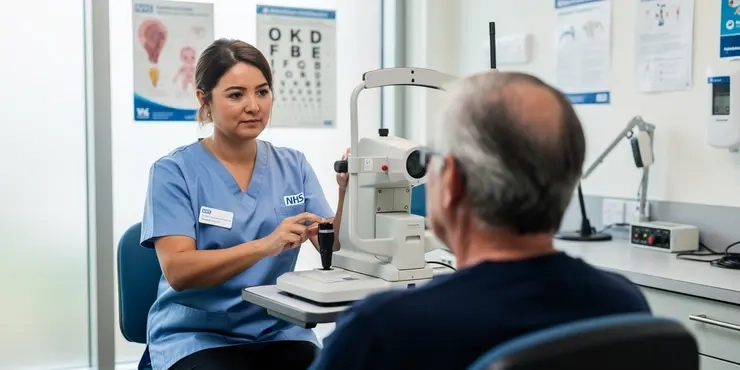
Derbyshire Diabetic Eye Screening - Diabetic Eye Screening
Relevance: 100%
-
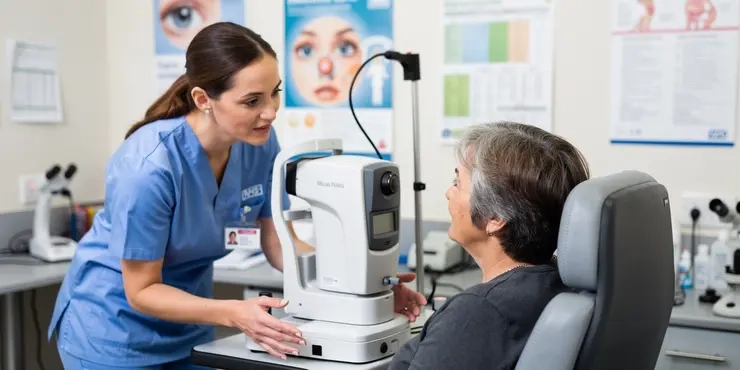
Diabetes Eye Screening
Relevance: 97%
-
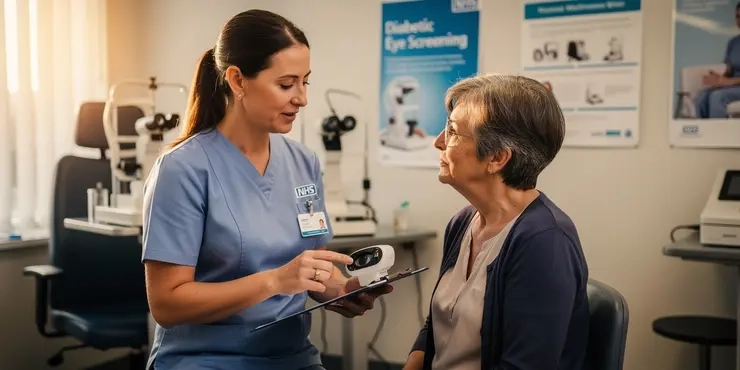
Derbyshire Diabetic Eye Screening - Your Screening Appointment
Relevance: 88%
-
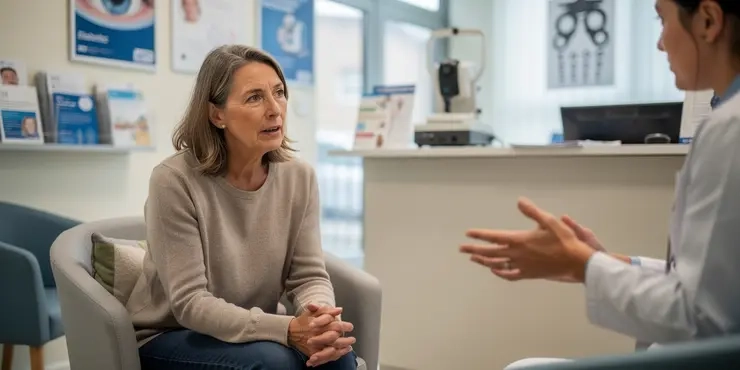
Derbyshire Diabetic Eye Screening - Assessment Clinic Appointment
Relevance: 81%
-
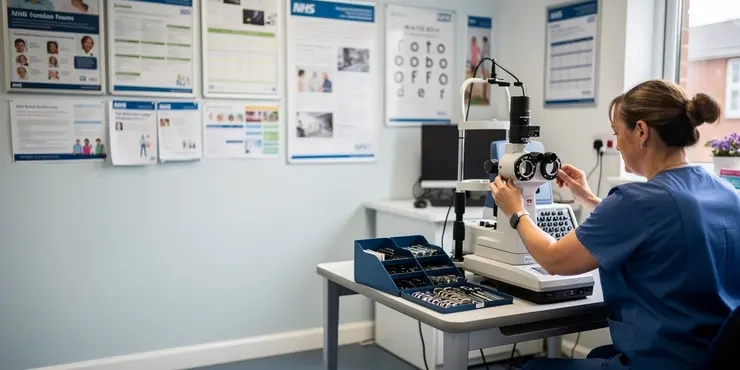
North Yorkshire Diabetic Eye Screening Programme - A day in the life
Relevance: 78%
-
What are the limitations of type 1 diabetes screening?
Relevance: 55%
-
Should I screen my child for type 1 diabetes?
Relevance: 55%
-
What does screening for type 1 diabetes involve?
Relevance: 53%
-
Does insurance cover type 1 diabetes screening?
Relevance: 53%
-
Where can I have my child screened for type 1 diabetes?
Relevance: 52%
-
Why should I consider screening my child for type 1 diabetes?
Relevance: 52%
-
At what age should my child be screened for type 1 diabetes?
Relevance: 51%
-
Should siblings of a child with type 1 diabetes also be screened?
Relevance: 51%
-
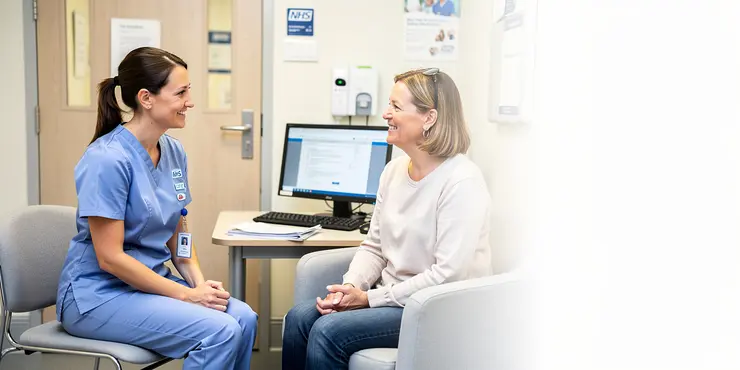
Health Screenings You Should Know About
Relevance: 48%
-
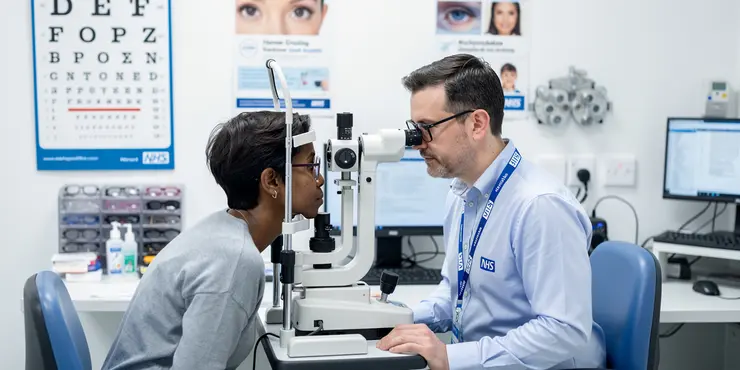
Are self-tests a substitute for professional eye exams?
Relevance: 42%
-
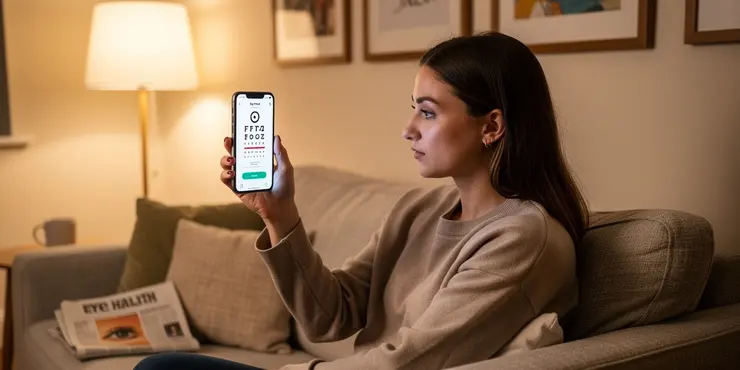
Can I use a smartphone for self-testing my eyes?
Relevance: 41%
-
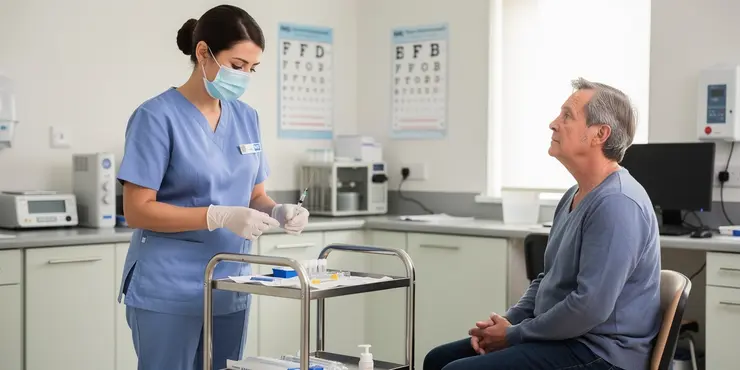
Eye Injections at Royal Bournemouth Hospital
Relevance: 40%
-
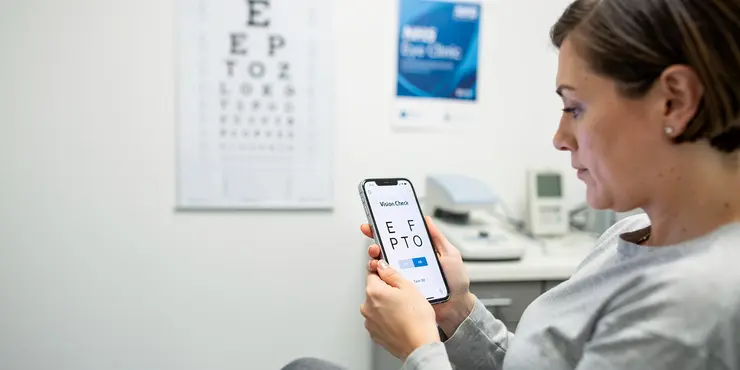
How accurate are app-based eye tests?
Relevance: 40%
-
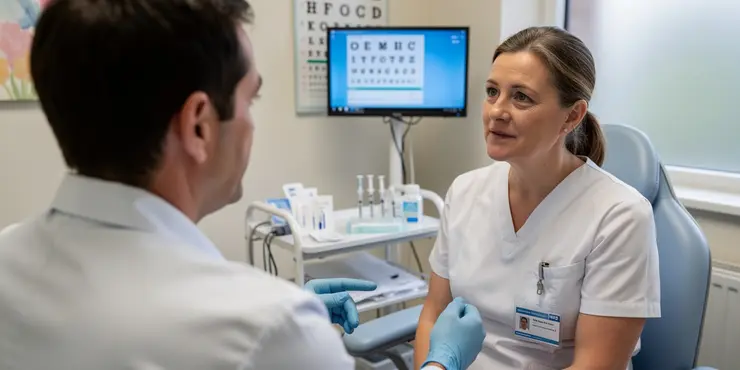
Eye Injections at Royal Bournemouth Hospital
Relevance: 40%
-
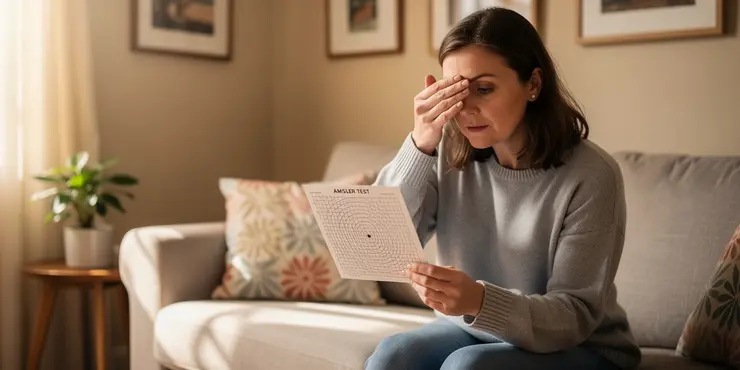
What is self-testing for eye patients?
Relevance: 39%
-
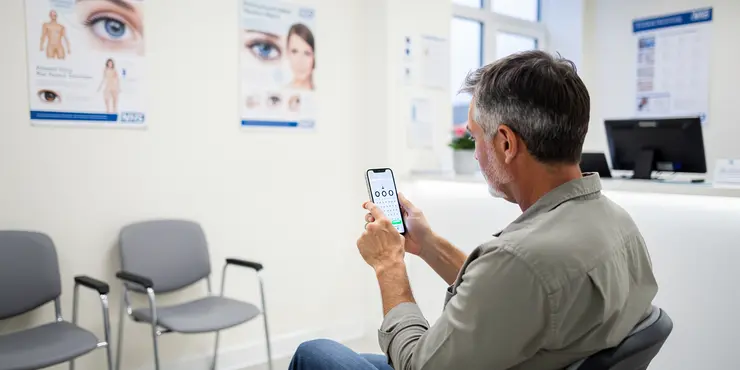
What are the limitations of self-testing for eyes?
Relevance: 38%
-
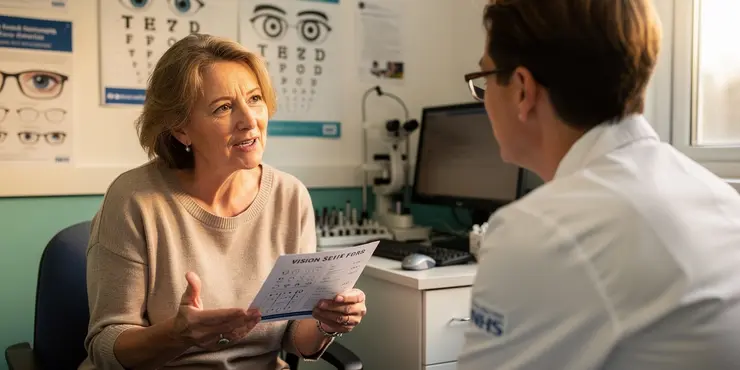
Should I share the results of my self-tests with my eye doctor?
Relevance: 38%
-
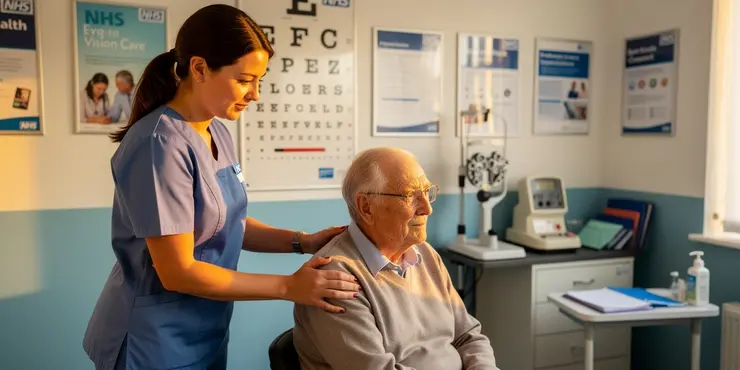
How often should I self-test my eyes?
Relevance: 38%
-
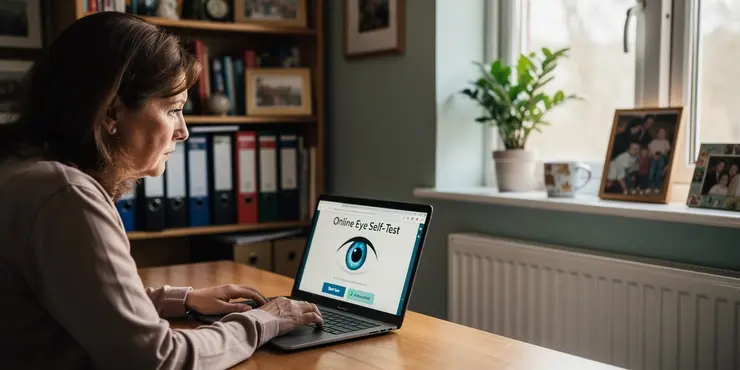
Why would someone need to self-test their eyes?
Relevance: 37%
-
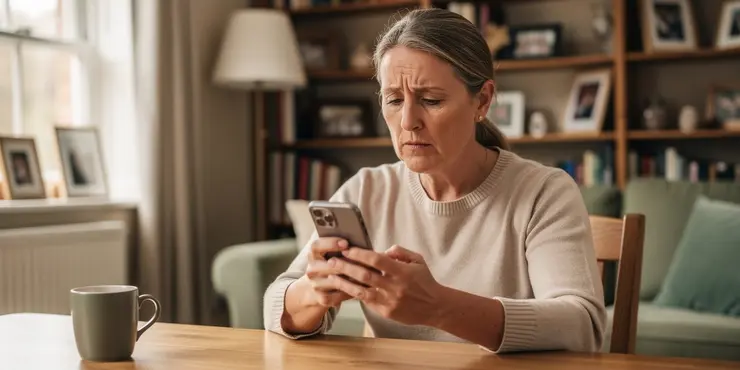
Can self-testing detect all eye conditions?
Relevance: 37%
-
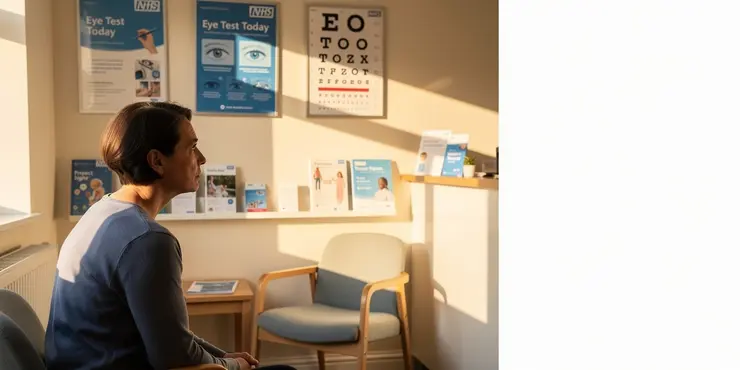
Do I need any special equipment for eye self-testing?
Relevance: 37%
-
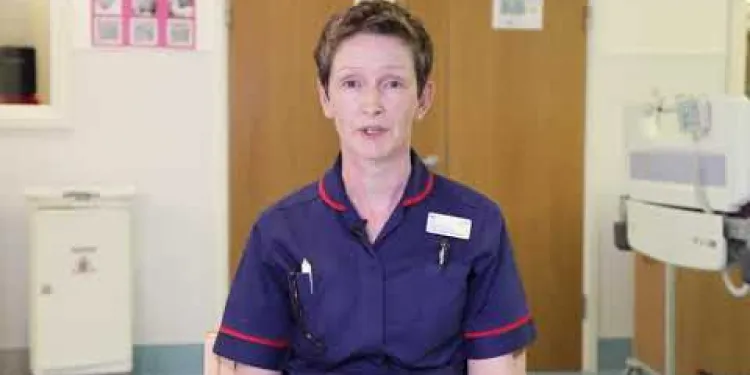
Gestational Diabetes during pregnancy
Relevance: 36%
-
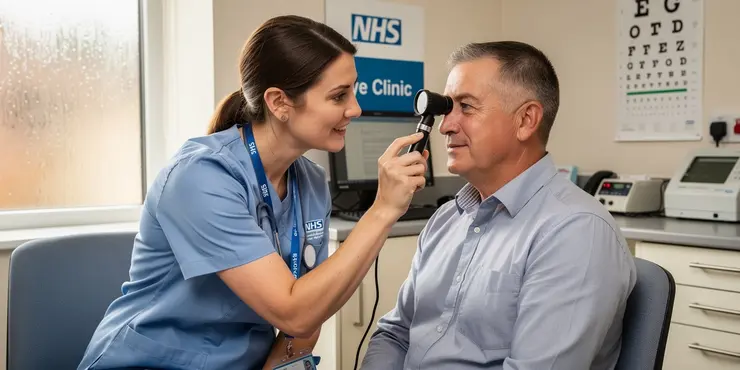
What is hypotony in the eye?
Relevance: 36%
-
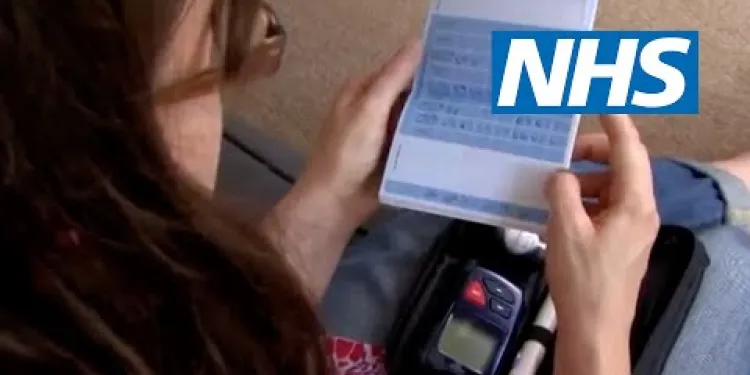
Gestational diabetes | NHS
Relevance: 36%
-
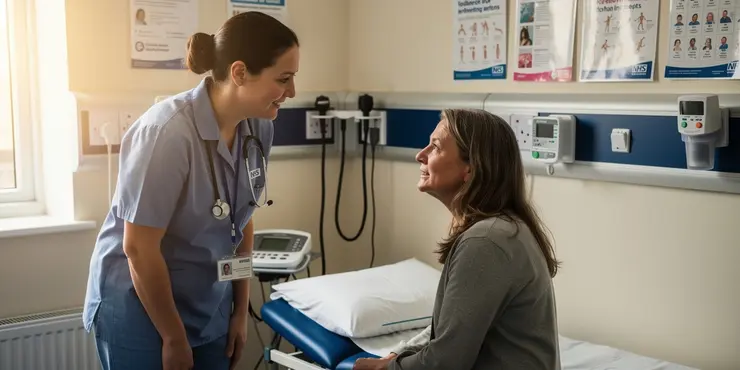
What are the symptoms of Type 2 Diabetes?
Relevance: 36%
-
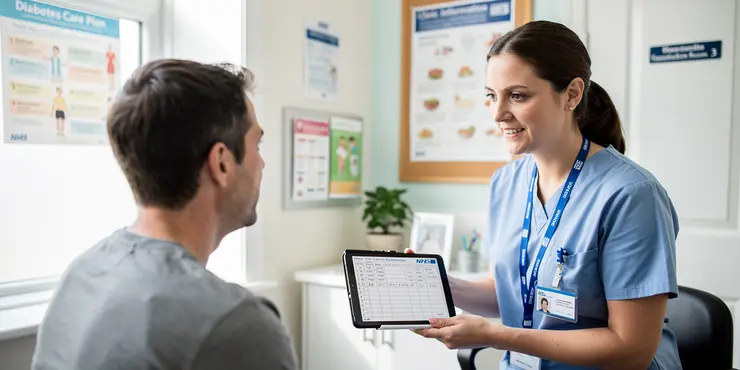
How is Type 2 Diabetes treated?
Relevance: 35%
-
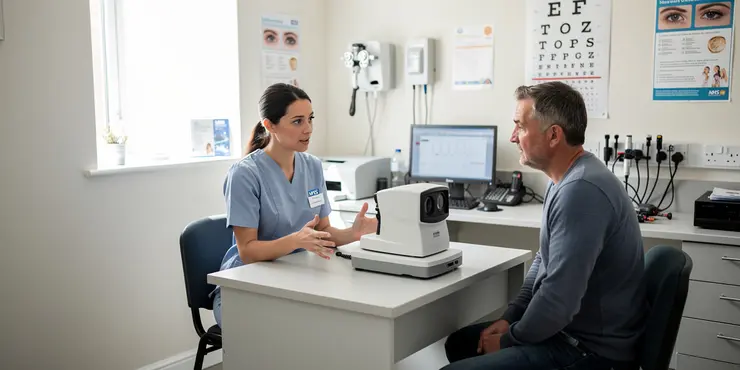
Are there any self-tests for eye pressure?
Relevance: 35%
-
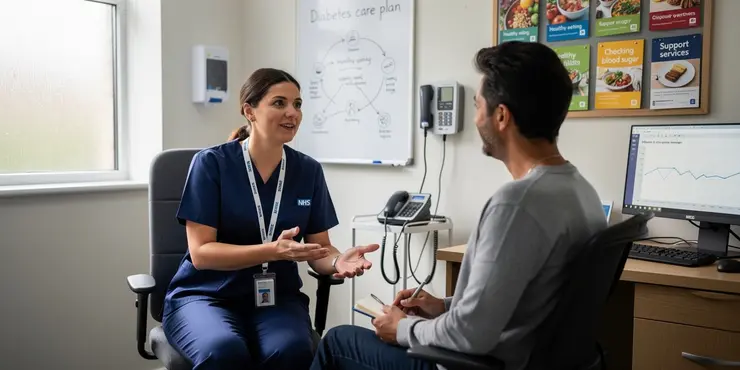
What complications are associated with Type 2 Diabetes?
Relevance: 34%
-
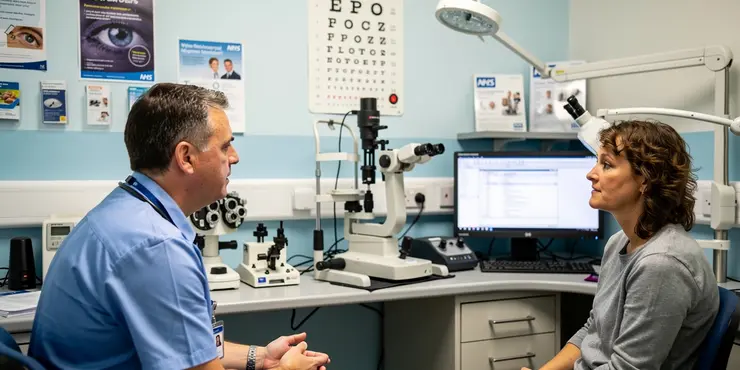
What is the eye condition hypotony?
Relevance: 33%
-
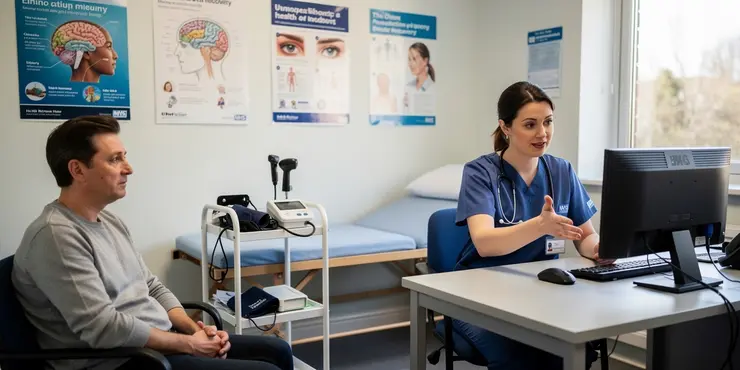
Should people with a concussion avoid screens and technology?
Relevance: 33%
-
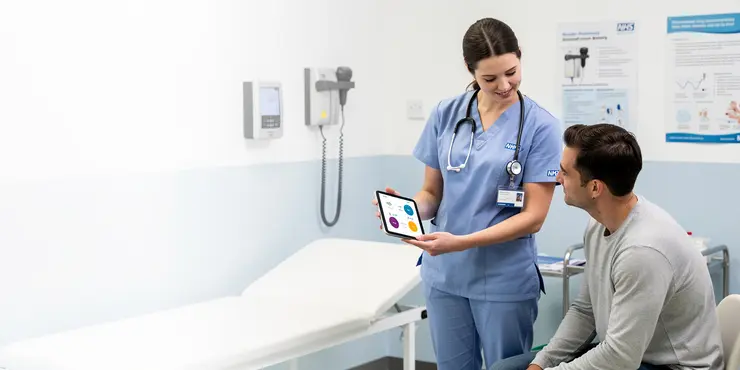
Improving outcomes for people with diabetes
Relevance: 33%
-
How often should screening be conducted if my child is at risk?
Relevance: 33%
-
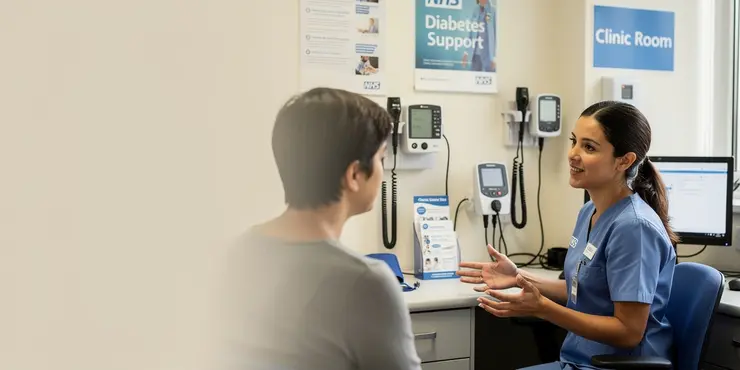
Is Type 2 Diabetes hereditary?
Relevance: 33%
-
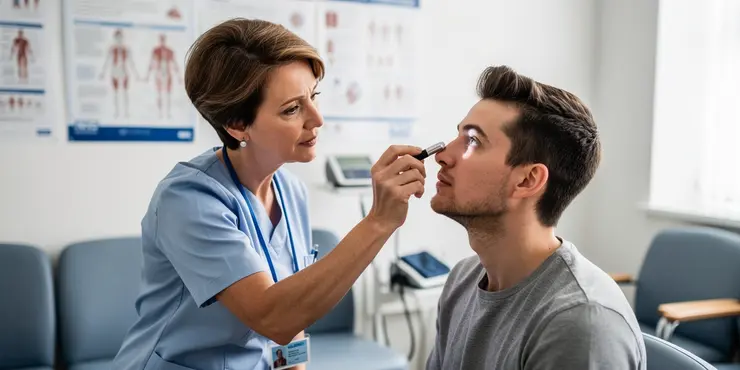
West Midlands LEHN Animated Video on Eye Health
Relevance: 33%
-
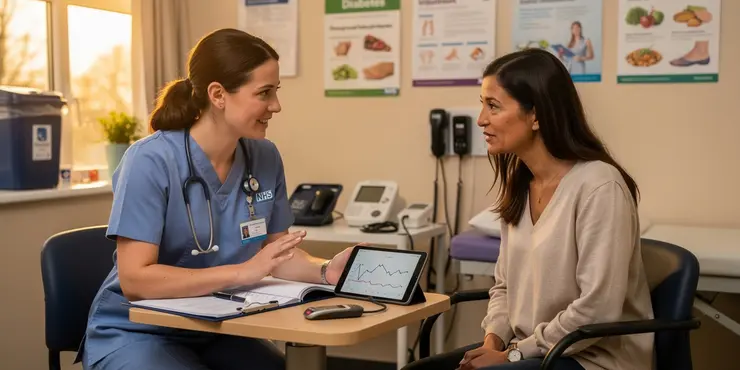
What Is Type 2 Diabetes? | 2 Minute Guide | Diabetes UK
Relevance: 33%
Derbyshire Diabetic Eye Screening
What is Diabetic Eye Screening?
Diabetic eye screening is a critical procedure aimed at detecting eye problems caused by diabetes early on. In Derbyshire, this service is provided to people with diabetes aged 12 and over. The screening helps identify early signs of diabetic retinopathy, which, if left untreated, can lead to blindness.
Why is it Important?
Diabetic retinopathy is a complication of diabetes where high blood sugar levels damage the retina, the part of the eye that detects light and sends signals to the brain. Early detection through regular screening can prevent irreversible damage and reduce the risk of sight loss. The screening is an essential preventive measure to ensure diabetic patients maintain their vision and overall eye health.
How Does the Screening Process Work?
The screening process in Derbyshire involves a simple and quick procedure. First, eye drops are placed in the patient’s eyes to widen the pupils, which might cause temporary blurry vision. After approximately 20 minutes, the technician takes photographs of the back of the eyes. These images are then analyzed for signs of diabetic retinopathy. Results are typically available within a few weeks, and if any issues are detected, the patient will be referred to a specialist.
Who Should Get Screened?
All diabetic individuals aged 12 and above residing in Derbyshire are eligible for the annual eye screening. Even if you feel that your vision is fine, screening is essential, as early stages of diabetic retinopathy might not present noticeable symptoms. Staying proactive through regular screenings can save your vision and detect problems before they become severe.
How to Book an Appointment
Booking an appointment for diabetic eye screening in Derbyshire is straightforward. You will receive an invitation via mail to attend the screening at a nearby location. Typically, screenings are held in community clinics, hospitals, or GP practices. If you haven’t received an invitation or have missed your appointment, contact your healthcare provider to schedule your screening as soon as possible.
Conclusion
Diabetic eye screening in Derbyshire is a vital service provided to ensure early detection and treatment of diabetic retinopathy. Regular screening can prevent serious vision impairment. Ensure you attend your annual screening to maintain optimal eye health and manage diabetes effectively.
Understanding Derbyshire Diabetic Eye Screening
Diabetic Eye Screening is a vital health program for individuals with diabetes in the United Kingdom, aimed at detecting eye issues early on. In Derbyshire, this screening service plays a crucial role in preventing vision complications associated with diabetes.
What is Diabetic Eye Screening?
Diabetic eye screening is an essential annual test provided free of charge through the NHS for people with diabetes. Its purpose is to detect any early signs of diabetic retinopathy, a condition that can lead to vision loss if untreated. Early detection through regular screening helps manage and mitigate potential complications before they adversely affect vision.
Who Should Attend the Screening?
All adults with diabetes aged 12 and over in Derbyshire should attend regular diabetic eye screening appointments. Whether you have Type 1 or Type 2 diabetes, attending these screenings is critical, as the risk of developing diabetic retinopathy increases with the duration of the diabetes condition.
What to Expect During the Screening
The screening involves a simple, painless process. It typically includes taking digital photographs of the back of your eyes by a specialist. The images are then examined for signs of damage or changes in the retina caused by diabetes. It's a quick procedure and usually lasts about 30 minutes.
Why is Regular Screening Important?
Regular screening is vital for preserving vision health among individuals with diabetes. Since the early stages of diabetic retinopathy often present no noticeable symptoms, screenings are the only efficient method to detect the condition before it progresses. Timely intervention can prevent severe vision impairment or blindness caused by this condition.
How to Access Diabetic Eye Screening in Derbyshire
In Derbyshire, diabetic eye screening is coordinated through the NHS. You can schedule your screening directly through your GP or receive an invitation from the local diabetic eye screening program. Regular attendance, even if no symptoms are present, helps ensure any eye issues are caught early and managed effectively.
For more information on diabetic eye screening in Derbyshire or to schedule an appointment, you are encouraged to contact your local GP or visit the NHS website. Prioritizing regular eye checkups helps maintain optimal eye health and prolongs quality of life for individuals with diabetes.
Derbyshire Diabetic Eye Screening
What is Diabetic Eye Screening?
Diabetic eye screening checks your eyes for problems caused by diabetes. In Derbyshire, people aged 12 and older can get this test. It looks for signs of diabetic retinopathy, which can cause blindness if not treated.
Why is it Important?
Diabetic retinopathy happens when diabetes damages the eye. It can lead to sight loss. Regular screening finds problems early. This helps protect your sight and keeps your eyes healthy. It is important for all people with diabetes to have this check-up.
How Does the Screening Process Work?
Screening in Derbyshire is simple and quick. First, you get eye drops that might make your vision blurry for a short time. Then, a technician takes photos of your eyes. These photos show if there are any problems. The results come in a few weeks. If there is a problem, you will see a specialist.
Who Should Get Screened?
Everyone with diabetes aged 12 and over in Derbyshire should get screened each year. Even if you think your eyes are fine, you should still go. Early signs of diabetic retinopathy might not show any symptoms. Regular check-ups can help catch these problems early.
How to Book an Appointment
Booking an appointment is easy. You will get a letter telling you when and where to go. Screenings happen at local clinics, hospitals, or GP practices. If you miss your appointment or have not received a letter, call your doctor to arrange a screening.
Conclusion
Diabetic eye screening in Derbyshire helps find and treat eye problems early. Regular screening can stop serious eye damage. Make sure to attend your screening every year to keep your eyes healthy.
Understanding Derbyshire Diabetic Eye Screening
Diabetic Eye Screening is a health check for people with diabetes in the UK. It helps find eye problems early so they can be fixed. In Derbyshire, this check is important to stop eye problems from getting worse.
What is Diabetic Eye Screening?
This is a yearly test for people with diabetes, and it's free with the NHS. The test checks for early signs of eye problems called diabetic retinopathy. If you find it early, you can stop it from harming your eyes.
Who Should Attend the Screening?
Everyone aged 12 or older with diabetes in Derbyshire should go to these eye checks. It doesn't matter if you have Type 1 or Type 2 diabetes. The longer you have diabetes, the more important it is to get checked every year.
What to Expect During the Screening
The test is simple and does not hurt. A doctor takes pictures of the back of your eyes. They look at these pictures to see if diabetes is hurting your eyes. The whole check takes about 30 minutes.
Why is Regular Screening Important?
Regular checks help keep your eyes healthy if you have diabetes. Often, eye problems from diabetes do not show signs early. But with these checks, they can be found early before they get worse. Getting help in time can stop you from losing your sight.
How to Access Diabetic Eye Screening in Derbyshire
In Derbyshire, the NHS runs the eye checks. You can book your check through your GP, or they might send you a letter to come in. Even if you feel fine, going to these checks is very important to catch any problems early.
If you want to know more about eye checks for diabetes in Derbyshire or to book a time, talk to your GP or look at the NHS website. Regular eye checks help keep your eyes healthy and protect your sight if you have diabetes.
Frequently Asked Questions
What is diabetic eye screening?
Diabetic eye screening is a program designed to detect eye complications that can occur in people with diabetes. It involves taking photographs of the back of the eye to identify any potential issues early, allowing for timely treatment.
Why is diabetic eye screening important?
Screening is important because it can detect diabetic retinopathy, a complication of diabetes that can lead to vision loss if not treated. Early detection and treatment can prevent up to 98% of severe vision loss.
Who is eligible for diabetic eye screening?
All people with diabetes aged 12 and over in the UK are eligible for regular diabetic eye screening.
How often should I have a diabetic eye screening?
You should have a diabetic eye screening once a year if you are eligible.
Is there any preparation required before attending a diabetic eye screening appointment?
Before your screening appointment, you don't need to do anything special, but you may be advised to wear sunglasses afterward as the eye drops used can make your eyes sensitive to light.
What happens during a diabetic eye screening appointment?
During the screening, special drops are put into your eyes to widen the pupils, and photographs are taken of the back of your eyes using a digital camera. The process is quick and generally takes about 30 minutes.
Are there any side effects from the eye drops used in the screening?
The eye drops used can cause temporary blurred vision and sensitivity to light, so you should not drive until your vision returns to normal, which may take a few hours.
Will I receive my results immediately after the screening?
No, you won't receive results immediately. Photographs of your eyes will be assessed and you will receive a letter with your results usually within a few weeks.
What do the screening results mean?
If your results show early signs of diabetic retinopathy, you may be referred to a specialist for further assessment and treatment. If everything is normal, you will be invited for screening again the following year.
What if I am pregnant and have diabetes?
Pregnant women with diabetes are at higher risk for diabetic eye disease, so more frequent screenings are recommended, typically once every trimester.
Do I need a referral from my GP for diabetic eye screening?
No referral is needed. People with diabetes are automatically included in the eye screening program and will receive invitations.
Can I eat or drink normally before the screening?
Yes, you can eat and drink as normal before your screening appointment.
Does the screening cost anything?
No, diabetic eye screening is provided free of charge as part of the NHS diabetic eye screening programme.
What should I do if I notice changes in my vision?
If you notice any changes in your vision, you should contact your GP or optometrist immediately for advice, even if you have regular screening appointments.
Is diabetic eye screening the same as a routine eye exam?
No, diabetic eye screening specifically checks for retinopathy, whereas a routine eye exam is a general check-up of eye health and vision.
What is diabetic eye screening?
Diabetic eye screening is a test that checks your eyes. It helps find eye problems caused by diabetes early.
If you have diabetes, your eyes can have problems. This test can help keep your eyes healthy.
It is important to have this test every year. It can help stop serious eye troubles.
If you find reading hard, you can ask someone to help you understand. You can also use tools that read the text aloud.
Diabetic eye screening is a special program. It helps find eye problems in people who have diabetes. This program takes pictures of the back of your eye. These pictures help doctors find problems early, so they can treat them quickly.
Why is it important to check eyes if you have diabetes?
Checking your eyes when you have diabetes is very important. Diabetes can make your eyes not work well.
Eye check-ups can help find problems early. This can stop or slow down eye damage.
Regular checks help keep your eyes healthy.
If you feel scared, ask someone to come with you. You can also use simple pictures or videos to learn more. These tools can help you understand better.
Screening is important. It can find diabetic retinopathy. This is a problem from diabetes. It can make you lose your sight if not fixed. Finding it early and treating it can stop 98% of bad sight loss.
To help remember: Get your eyes checked by a doctor.
Who can have a diabetic eye check?
People with diabetes can have a special eye check. This eye check is important to keep your eyes healthy.
If you have diabetes, ask your doctor about an eye check.
It helps to have someone with you for support when you go for the check-up.
All people with diabetes who are 12 years old and older in the UK can get their eyes checked regularly.
How often should I get my eyes checked for diabetes?
If you have diabetes, it is important to get your eyes checked every year. This helps keep your eyes healthy.
Remember to book your eye test every 12 months. Ask someone for help to book the test if you need it.
You should get your eyes checked for diabetes once a year if it is right for you.
What do I need to do before my eye check-up for diabetes?
Before your eye check-up, you don't need to do anything special. But you might want to wear sunglasses after the check-up. The eye drops can make your eyes hurt in bright light.
What happens at a diabetic eye check-up?
When you go for a diabetic eye check-up, the doctor will look at your eyes. This is to make sure your eyes are healthy. The doctor uses a camera to take pictures of the back of your eyes.
Before that, you might get special eye drops. These drops make your pupils bigger so the doctor can see inside better. The drops might make your eyes feel a bit tingly or blurry, but it will go away soon.
The eye check-up is important because it can catch problems early. This helps keep your eyes healthy. If you have questions, you can ask the doctor. Bringing a friend or family member can also be helpful.
When you go for the eye check-up, the doctor puts special drops in your eyes. These drops make the black part in the middle of your eyes (called pupils) bigger. Then, the doctor takes pictures of the back of your eyes with a camera. This doesn't take long, usually about 30 minutes.
Do the eye drops used in the test cause any problems?
When you have an eye test, the doctor might use eye drops. Sometimes, these eye drops can cause a few things like:
- Eyes might sting or feel a bit sore.
- Vision could get blurry for a short time.
- Bright lights might be too bright.
If you feel worried, you can talk to the doctor. They are there to help you. Using sunglasses can help if bright lights are a problem. If your eyes feel dry, you can use special eye drops that are safe and make eyes feel better.
The eye drops might make your vision blurry and your eyes more sensitive to light. Do not drive until your vision is clear again. This could take a few hours.
Will I get my results right after the test?
After you finish the test, you might have to wait a little to get your results. Sometimes, you can get them right away. Other times, you may have to wait a few days. Ask the person giving the test when you will know your results. You could use a calendar or a notebook to write down the date if you have to wait.
You will not get your test results right away. Doctors will look at the pictures of your eyes. You will get a letter with the results in a few weeks.
If you find reading hard, you can ask someone to help you read the letter. You can also try using a tool that reads the letter out loud for you.
What do the screening results mean?
The screening results show what the test found. It tells if there might be a problem with health. The results can say:
- Normal: This means everything looks okay.
- Abnormal: This means something does not look right. It might not mean you are sick, but you should talk to a doctor.
If you have questions, you can:
- Ask a doctor or nurse to explain.
- Use pictures or videos to help understand.
If your test shows early signs of eye problems from diabetes, you might go to a doctor who knows a lot about eyes for more tests and help. If your eyes are fine, you will have another test next year.
What if I am pregnant and have diabetes?
If you have diabetes and are going to have a baby, it is important to take care of yourself and your baby. Here’s what you can do:
- Visit your doctor regularly. They will help you stay healthy.
- Eat healthy foods. This helps keep your blood sugar steady.
- Check your blood sugar often. Use a meter to see the numbers.
- Take any medicine your doctor gives you. This helps your body work well.
- Exercise safely. Moving around helps keep you fit.
Ask someone you trust for help if you need it. You are not alone!
Pregnant women with diabetes should have their eyes checked more often. This is because they have a higher risk for eye problems. It is good to have an eye check-up once each trimester (this means every three months while pregnant).
Do I need my doctor to send me for an eye check if I have diabetes?
You don't need a letter from a doctor. If you have diabetes, you will get an invitation to have your eyes checked.
Can I eat or drink like usual before the test?
Yes, you can have food and drinks as you normally do before the test. If you have more questions, ask someone who knows about the test.
You can eat and drink like you usually do before your appointment.
Do you have to pay for the test?
No, you do not have to pay for diabetic eye screening. It is free. This is because the NHS has a programme to check the eyes of people with diabetes.
What to Do if Your Eyesight Changes
If you notice your eyesight is different, here are some simple steps to help:
- Tell an adult you trust. This could be a parent, teacher, or friend.
- Make an appointment to see an eye doctor. They are also called optometrists or ophthalmologists.
- Write down any changes you see. For example, if things look blurry or if you see spots.
- Rest your eyes. If they feel tired, take a break from screens like TVs, computers, or phones.
- Use good light when reading or doing close work.
For support, you can try:
- Using tools to make things bigger, like a magnifying glass.
- Listening to audiobooks instead of reading small print.
Remember, if your eyesight changes, getting help quickly is important.
If you see any changes in your eyesight, tell your doctor or eye doctor right away. This is important even if you see them often.
Is a diabetes eye check the same as a regular eye test?
A diabetes eye check is not the same as a regular eye test. When you have a diabetes eye check, the doctor looks at the back of your eye to find problems. This test can help stop damage before it gets worse.
A regular eye test checks if you need glasses and if your eyes are healthy. Both tests are important for people with diabetes.
You can bring someone with you to help during your eye check. Some people find it useful to write down any questions before going.
No, these tests are different. A diabetic eye screening checks for damage from diabetes in the eyes. This is called retinopathy. A regular eye exam is a check-up to see how healthy your eyes are and if you need glasses.
Useful Links
This website offers general information and is not a substitute for professional advice.
Always seek guidance from qualified professionals.
If you have any medical concerns or need urgent help, contact a healthcare professional or emergency services immediately.
Some of this content was generated with AI assistance. We’ve done our best to keep it accurate, helpful, and human-friendly.
- Ergsy carfully checks the information in the videos we provide here.
- Videos shown by Youtube after a video has completed, have NOT been reviewed by ERGSY.
- To view, click the arrow in centre of video.
- Most of the videos you find here will have subtitles and/or closed captions available.
- You may need to turn these on, and choose your preferred language.
- Go to the video you'd like to watch.
- If closed captions (CC) are available, settings will be visible on the bottom right of the video player.
- To turn on Captions, click settings .
- To turn off Captions, click settings again.
More Items From Ergsy search
-

Derbyshire Diabetic Eye Screening - Diabetic Eye Screening
Relevance: 100%
-

Diabetes Eye Screening
Relevance: 97%
-

Derbyshire Diabetic Eye Screening - Your Screening Appointment
Relevance: 88%
-

Derbyshire Diabetic Eye Screening - Assessment Clinic Appointment
Relevance: 81%
-

North Yorkshire Diabetic Eye Screening Programme - A day in the life
Relevance: 78%
-
What are the limitations of type 1 diabetes screening?
Relevance: 55%
-
Should I screen my child for type 1 diabetes?
Relevance: 55%
-
What does screening for type 1 diabetes involve?
Relevance: 53%
-
Does insurance cover type 1 diabetes screening?
Relevance: 53%
-
Where can I have my child screened for type 1 diabetes?
Relevance: 52%
-
Why should I consider screening my child for type 1 diabetes?
Relevance: 52%
-
At what age should my child be screened for type 1 diabetes?
Relevance: 51%
-
Should siblings of a child with type 1 diabetes also be screened?
Relevance: 51%
-

Health Screenings You Should Know About
Relevance: 48%
-

Are self-tests a substitute for professional eye exams?
Relevance: 42%
-

Can I use a smartphone for self-testing my eyes?
Relevance: 41%
-

Eye Injections at Royal Bournemouth Hospital
Relevance: 40%
-

How accurate are app-based eye tests?
Relevance: 40%
-

Eye Injections at Royal Bournemouth Hospital
Relevance: 40%
-

What is self-testing for eye patients?
Relevance: 39%
-

What are the limitations of self-testing for eyes?
Relevance: 38%
-

Should I share the results of my self-tests with my eye doctor?
Relevance: 38%
-

How often should I self-test my eyes?
Relevance: 38%
-

Why would someone need to self-test their eyes?
Relevance: 37%
-

Can self-testing detect all eye conditions?
Relevance: 37%
-

Do I need any special equipment for eye self-testing?
Relevance: 37%
-

Gestational Diabetes during pregnancy
Relevance: 36%
-

What is hypotony in the eye?
Relevance: 36%
-

Gestational diabetes | NHS
Relevance: 36%
-

What are the symptoms of Type 2 Diabetes?
Relevance: 36%
-

How is Type 2 Diabetes treated?
Relevance: 35%
-

Are there any self-tests for eye pressure?
Relevance: 35%
-

What complications are associated with Type 2 Diabetes?
Relevance: 34%
-

What is the eye condition hypotony?
Relevance: 33%
-

Should people with a concussion avoid screens and technology?
Relevance: 33%
-

Improving outcomes for people with diabetes
Relevance: 33%
-
How often should screening be conducted if my child is at risk?
Relevance: 33%
-

Is Type 2 Diabetes hereditary?
Relevance: 33%
-

West Midlands LEHN Animated Video on Eye Health
Relevance: 33%
-

What Is Type 2 Diabetes? | 2 Minute Guide | Diabetes UK
Relevance: 33%


